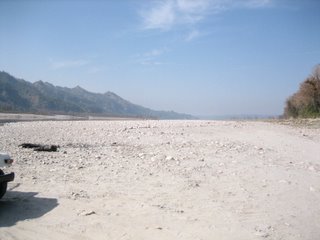Jhiyol is a town about a half hours drive from Tapovan, and thee venue for the latest field visit.
The aim was to assess the impact of the various Mahila Mandals, on the town, the health of the workers, and then to pick up on the positive aspects, while not neglecting the weaknesses. With this knowledge, a future policy can be charted, implemented and once again assessed in due course.
Apart from thee strength of the Mahila Mandals (mahila - woman; mandal - group) the need for participants is critical to the success of the seminar. The kids were sent from house to house to drag and convince the women - and men - to the meeting. Naren energised them with the slogan "Chalke milke baath karenge" (quite literally, walking, meeting, we will meet).
All the participants were split into groups to discuss the impacts etc. Th concept of splitting into groups based on the facilitator giving them a number of 1,2, or 3 was alien and took some time to organise. To open up and voice their thoughts also took some time, but in the end many came up with many salient points.
The inadequacies of the village were present all around us. In front of me a child squatted, near, but not close enough to a small drainage gully. The child urinated, the puddle forming between the child's feet, some being absorbed into the cloth of the his pants. Uncleaned the child stood, cheered at the thought of another mission completed successfully, not knowing or realising the simple task of being clean.
Meanwhile the men of the village were at home and didn't come because India were playing Pakistan. This was the excuse we got when we asked them to attend. It seems to me that, game or no game, while most of the developmental focus is - quite rightly - through the women, the men of the villages see little rehabilitation. Maybe its due to pride or alcohol, or lack of effort, but the sad fact stands.
The women though are sufficiently involved in all the activities and for CORD are the nodal points of any vikas (development) in the villages. From thee mahila mandals rise the other programs - self-help groups, income-generating schemes, bank linkages through loans, and many other developmental and community work.
Though these women may be different to what you and I know, there is one universal feature: the incessant need to converse, express, and share. At every chance noise would break out and the facilitators would have to scream to be heard.
Two of the messages delivered with the most potency are to ensure that all houses have toilets
and thee burning or plastic. At this session, of the fifty or sixty women present, only ten stood to confirm the existence of a toilet in their homes. A simple toilet can be built for as little as rs.150 - 200, yet its quite possible that many of thee toilet-less homes have a decent sized colour TV, with cable.
Plastics is more of a CORD campaign. The standard operating procedure is to collect plastic and burn them, thereby polluting the air and the soil into which the toxic ash will be absorbed. It was explained to them, that this will then affect their crops, the water which they drink, and the follow through affects not only for their kids, but all future generations.
It was also explained that the toxic gas would harm the lungs of everyone and may cause miscarriages, asthma and other diseases.
To close the session, the town folk were shown a video on clean water, acted out by over enthusiastic artisans. As a rule, Deepika didi insists each meeting end with a song and dance session. And these villagers, needed no help in getting started.







